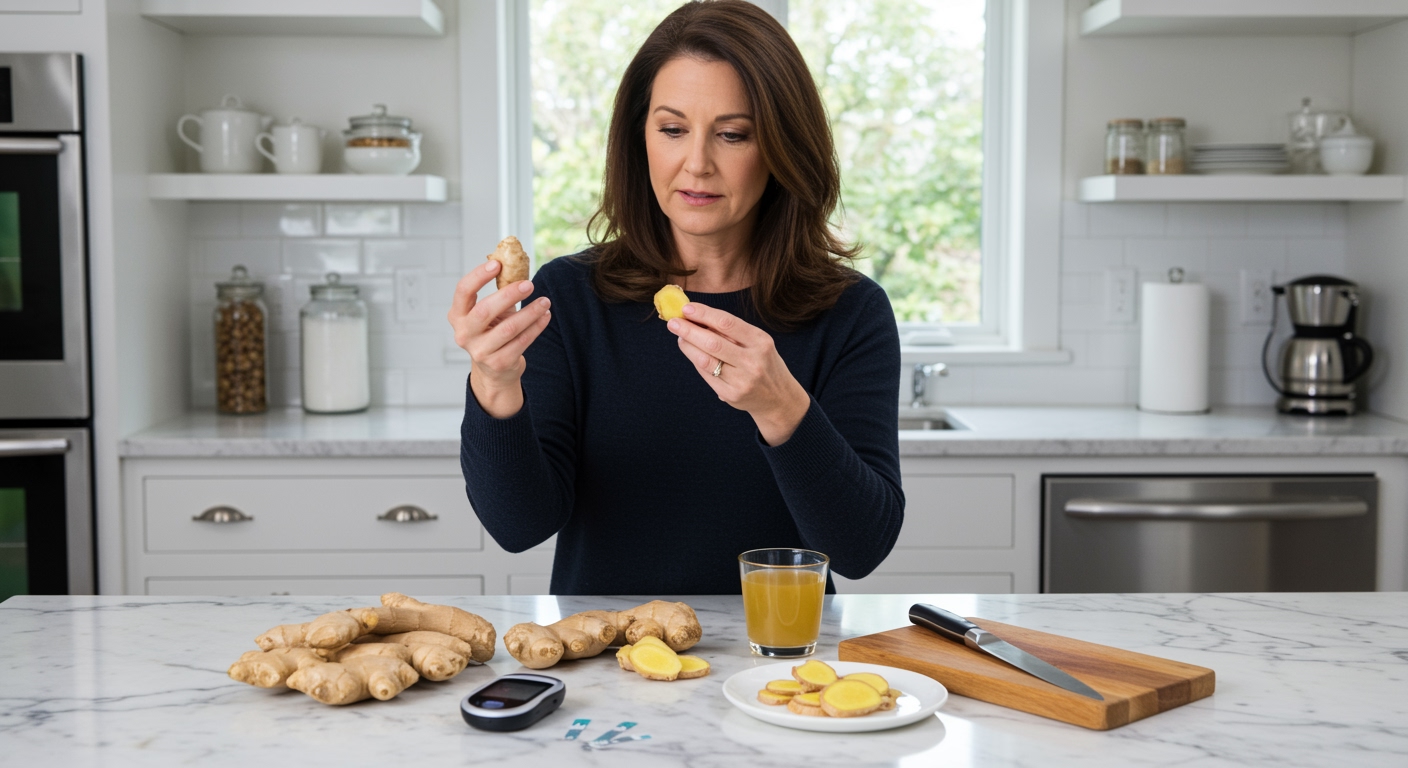✪ Key Takeaway: Ginger can help lower blood sugar levels and improve insulin sensitivity when used consistently as part of diabetes management.
Introduction
Your grandmother probably used ginger for stomach problems, but she might not have known about its powerful effects on blood sugar.
You might be wondering if this common kitchen spice can really make a difference in managing diabetes or preventing blood sugar spikes after meals.
Hi, I’m Abdur, your nutrition coach and today I’m going to explain exactly how ginger affects your blood sugar levels and whether it deserves a place in your diabetes management plan.
How Does Ginger Actually Lower Blood Sugar?
Ginger contains powerful compounds called gingerols and shogaols that work directly on your body’s glucose metabolism.
These active compounds help your muscles absorb glucose more efficiently by increasing the activity of glucose transporter proteins.
When you consume ginger regularly, it enhances your body’s insulin sensitivity, which means your cells respond better to insulin signals.
Research shows that ginger also slows down the breakdown of carbohydrates in your digestive system.
This slower digestion prevents rapid blood sugar spikes after meals, giving your body more time to process glucose properly.
The spice works by inhibiting certain digestive enzymes that break down starches into simple sugars.
Additionally, ginger appears to stimulate insulin release from your pancreas when blood sugar levels rise, providing a natural regulatory mechanism.
✪ Fact: Ginger can reduce fasting blood sugar levels by up to 12% when consumed daily for 12 weeks.
What Does The Research Say About Ginger And Diabetes?
Multiple clinical studies have tested ginger’s effects on people with type 2 diabetes and prediabetes.
A significant study involving 88 diabetic patients found that taking 3 grams of ginger powder daily for 8 weeks reduced fasting blood glucose by an average of 19.4 mg/dL.
The same study showed improvements in HbA1c levels, which measure your average blood sugar over the past 2-3 months.
Another research project demonstrated that ginger supplementation improved insulin resistance markers in people with metabolic syndrome.
Scientists have also found that ginger consumption can reduce inflammatory markers associated with diabetes complications.
The anti-inflammatory effects are particularly important because chronic inflammation worsens insulin resistance over time.
However, most studies used ginger supplements rather than fresh ginger, so the optimal dosage from whole food sources remains unclear.
✪ Pro Tip: Combine ginger with cinnamon for enhanced blood sugar control benefits.
How Much Ginger Should You Take For Blood Sugar Control?
The effective dosage varies depending on whether you use fresh ginger, dried powder, or standardized extracts.
Most successful studies used between 1-3 grams of ginger powder daily, which equals about 1/2 to 1 teaspoon.
If you prefer fresh ginger root, you would need approximately 10-30 grams daily to match the research dosages.
This translates to roughly 1-3 inches of fresh ginger root, depending on the thickness.
You can divide this amount throughout the day by adding ginger to tea, smoothies, or meals.
Starting with smaller amounts helps your digestive system adjust, as ginger can cause stomach upset in sensitive individuals.
The timing of ginger consumption may also matter, with some evidence suggesting pre-meal consumption provides better blood sugar control.
✪ Note: Always start with small amounts and gradually increase to assess your tolerance.
Are There Any Risks Or Side Effects To Consider?
While ginger is generally safe for most people, it can interact with certain diabetes medications.
The combination of ginger with blood sugar lowering drugs might cause hypoglycemia or dangerously low blood sugar levels.
Ginger also has blood-thinning properties, which could be problematic if you take anticoagulant medications.
Some people experience digestive side effects like heartburn, stomach upset, or diarrhea when consuming large amounts.
Pregnant women should limit ginger intake to no more than 1 gram daily due to potential pregnancy complications.
People with gallstones should avoid therapeutic doses of ginger, as it may stimulate bile production.
If you experience any unusual symptoms or your blood sugar drops too low, discontinue use and consult your healthcare provider immediately.
✪ Pro Tip: Monitor your blood sugar more frequently when first adding ginger to your routine.
What Are The Best Ways To Include Ginger In Your Diet?
Fresh ginger root offers the most bioactive compounds and can be easily incorporated into daily meals.
Grating fresh ginger into hot water creates a simple tea that you can drink before meals for maximum blood sugar benefits.
Adding minced ginger to stir-fries, soups, and marinades provides both flavor and therapeutic compounds.
Ginger powder works well in smoothies, especially when combined with other blood sugar friendly ingredients like cinnamon and turmeric.
You can also pickle fresh ginger slices in rice vinegar for a tangy condiment that pairs well with protein-rich meals.
Crystallized ginger should be used sparingly due to its high sugar content, which could counteract the blood sugar benefits.
For consistent results, aim to include ginger in your diet daily rather than sporadically, as the benefits appear to build over time.
The Bottom Line
Ginger shows genuine promise as a natural tool for blood sugar management, with solid research backing its effectiveness.
Small daily habits with powerful compounds create lasting health transformations over time.
I would love to hear about your experiences with ginger or any questions you might have about incorporating it into your diabetes management plan, so please share your thoughts in the comments below.
References
At NutritionCrown, we use quality and credible sources to ensure our content is accurate and trustworthy. Below are the sources referenced in creating this article:
- PMC: Ginger and its constituents: role in prevention and treatment of gastrointestinal cancer
- Ubie Health: Ginger Blood Sugar Evidence
- PMC: The effects of ginger on fasting blood sugar, hemoglobin a1c, apolipoprotein B, apolipoprotein a-I and malondialdehyde in type 2 diabetic patients
- Medical News Today: Ginger for diabetes: Does it help?





